It’s a little raggedy and amateurish — it could obviously be a lot smoother and slicker — but the Black 20 folks who made this Spider-Man 3 product-placement trailer were coming from a good place.
Diesel vs. Kassovitz
If you care about the Vin Diesel vs. Mathieu Kassovitz clash on the Prague set of Babylon A.D., here’s a rundown courtesy of “Page Six.” Diesel is starring as “a war vet-turned-mercenary escorting a woman from Russia to Canada,” blah, blah…and then “things get dangerous when it turns out the woman is carrying an organism that a bizarre cult wants to harvest to produce a genetically modified Messiah,” blah, blah. It co-stars Michelle Yeoh, Gerard Depardieu and Charlotte Rampling. Kassovitz, 39, has directed eight films prior to this one (including ’03’s Gothika) and is a fairly well-known actor(Munich, Amelie, Amen, Birthday Girl). The movie sounds like second-rate crap. Whatever happened to Diesel anyway? He was on his way to being Next Big Guy, and now he’s Jean Claude van Damme.
Brando doc reviewed
Brando, the two-part, four-hour Turner Classic Movies documentary that will air on May 1st and 2nd, is a relatively candid, nicely sculpted, entirely respectable portrait of the single most influential actor of the 20th Century, and probably also the greatest.
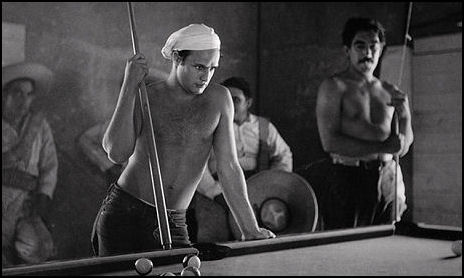
I was concerned that producer Leslie Greif and writer Mimi Freedman might make it too much of a valentine to the eminent Marlon Brando, and perhaps gloss over the tragedy of his life, but they consider and in some ways explore most of the substantive issues (i.e., the truth as most of his friends understood it) and gloss over the gnarly stuff only somewhat. There’s always pressure to deliver a love sonnet when you’re making one of these career-review docs, and Greif and Freedman are to be commended or at least given a pass for being as honest as the political climate probably allowed.
The glory of Brando is known to pretty much everyone except the under 25s, and anyone of that age who cares anything at all about movies or acting should definitely watch this. There’s a cornucopia of of wonder and ecstasy in Brando’s early performances (i.e., in five of his first six movies — The Men, A Streetcar Named Desire, Viva Zapata, Julius Caesar and On The Waterfront. I’ve always felt that his work in The Wild One was more iconic than rich.
The darkness of the Brando saga hangs on two hooks. One, that his last 30-plus years were all but wasted in terms of what he was capable of, and two, that the tragedies that claimed two of his children, Christian (the Dag Drollet murder, which led to Christian’s imprisonment) and Cheyenne (who hung herself) were strong indications that Brando was some kind of wretched, extremely wounding, self-absorbed father. The TCM doc acknowledges and discusses the first fairly throughly, but it tip-toes around the second.
Plus it doesn’t mention Brando’s longtime friend Wally Cox at all (a truly shocking omission) and it doesn’t get into the darker, kinkier stuff that was reported in Peter Manso‘s biography. It allows that Brando was an egoistic, self-absorbed mind- fucker at times (depending on who he was dealing with, or what the situation was) and it comes close to saying the poor man pretty much wasted his life after the early ’70s triumph of The Godfather and Last Tango in Paris. But it doesn’t bore in on this, and relatively few of the talking heads (Jane Fonda is an exception) are willing to say what they really thought about his dissolution.
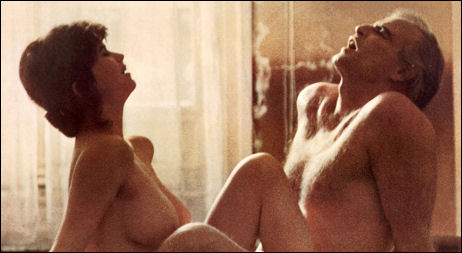
The emphasis, in short, is on how much everyone loved and admired him, which is what these docs always do — Marlon was great, he changed acting, he shook the earth, he was a God, etc. But the doc has a lot of truth in it also, certainly the emotional truth of how Brando’s naturalistic acting style impacted so many of his peers and became such an important benchmark — i.e., “before Brando” and “after Brando” — and inspired so much love and excitement.
The talking heads include Al Pacino, James Caan, Edward Norton, Martin Scorsese, Maximillian Schell, David Thomson, Kevin McCarthy, Bernardo Bertolucci, Frederic Forrest, Martin Landau, Budd Schulberg, John Travolta and Jon Voiight, among many others.
Here’s how some of the wrap-up sentiments sound (there’s too much music mixed into it, making the words hard to hear) and here’s Brando’s riveting delivery of the “dogs of war” speech from Julius Caesar.
Poop on the grey Hulk
Collider.com‘s Steve Weintraub (a.k.a. “Frosty”) spoke to producer Avi Arad at the recent Spider-Man 3 junket about the apparently locked-in decision to have a grey-colored Hulk in the new Edward Norton movie. “While someone else may have posted the story earlier than me,” Weintraub writes, “I’m the one who asked the questions that got [Arad] to talk. You can listen to the audio and hear me asking the questions for the proof.”
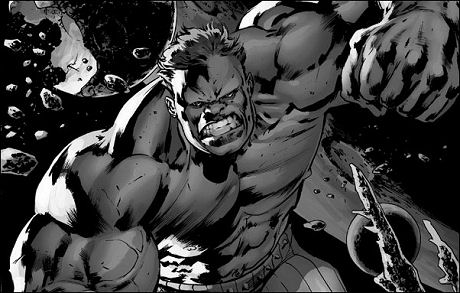
In The Land of Women reviews
Jon Kasdan‘s In The Land of Women (Warner Bros., 4.20) has only managed a lousy 48% Rotten Tomatoes rating, but it’s picked some classy “cream of the crop” allies, including L.A. Times critic Kenneth Turan, the Philadelpha Inquirer‘s Carrie Rickey, the Toronto Star‘s Susan Walker, the San Francisco Chroncile‘s Mick LaSalle and Newsweek‘s David Ansen.
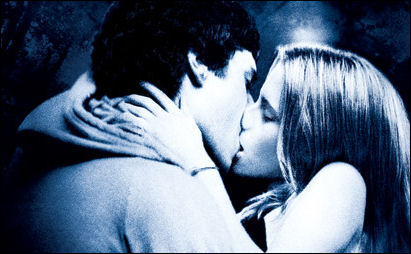
That said, many of the positive comments come from an attitude that say, in a nutshell, “Jon Kasdan is young and therefore his first-time-director mistakes are forgivable, on top of which it’s a little easier to cut him slack knowing that his dad, Lawrence Kasdan, has made several good films and that Jon will improve and…well, here’s to the family Kasdan!”
How Journalists Blew It on Iraq
It’s being claimed that “the most powerful indictment of the news media for falling down in its duties in the run-up to the war in Iraq” is contained in a 90-minute PBS broadcast called “Buying the War,” which marks the return of Bill Moyers Journal this coming Wednesday (4.25). Editor & Publisher was sent a preview DVD and a draft transcript for the program this week.
“While much of the evidence of the media’s role as cheerleaders for the war presented here is not new,” an E & P analysis reads, “it is skillfully assembled, with many fresh quotes from interviews (with the likes of Tim Russert and Walter Pincus) along with numerous embarrassing examples of past statements by journalists and pundits that proved grossly misleading or wrong.
“Several prominent media figures, prodded by Moyers, admit the media failed miserably, though few take personal responsibility.
“The war continues today, now in its fifth year, with the death toll for Americans and Iraqis rising again — yet Moyers points out, ‘the press has yet to come to terms with its role in enabling the Bush Administration to go to war on false pretenses.’
“Among the few heroes of this devastating film are reporters with the Knight Ridder/McClatchy bureau in D.C. Tragically late, Walter Isaacson, who headed CNN, observes, “The people at Knight Ridder were calling the colonels and the lieutenants and the people in the CIA and finding out, you know, that the intelligence is not very good. We should’ve all been doing that.”
“At the close, Moyers mentions some of the chief proponents of the war who refused to speak to him for this program, including Thomas Friedman, Bill Kristol, Roger Ailes, Charles Krauthammer, Judith Miller and William Safire.
“But Dan Rather, the former CBS anchor, admits, “I don’t think there is any excuse for, you know, my performance and the performance of the press in general in the roll up to the war√ɬ¢√¢‚Äö¬¨√Ǭ¶we didn’t dig enough. And we shouldn’t have been fooled in this way.”
“Bob Simon, who had strong doubts about evidence for war, was asked by Moyers if he pushed any of the top brass at CBS to ‘dig deeper,’ and he replies, ‘No, in all honesty, with a thousand mea culpas√ɬ¢√¢‚Äö¬¨√Ǭ¶.nope, I don’t think we followed up on this.'”
Harvey replies to Patrick
Hollywood Wiretap‘s Tom Tapp has posted Harvey Weinstein‘s reply to Patrick Goldstein‘s “what happened to the old Harvey?” piece that ran a few days ago in the L.A. Times. Weinstein’s answer is published in today’s Calendar section but not online (and barely visible in the paper) so Tapp has reproduced it for everyone’s reading pleasure:
“Goldstein says he misses ‘the Harvey Weinstein (he) used to know,'” Weinstein begins, “claiming that ‘the Oscar impresario who…was truly, madly, deeply in love with movies’ has been replaced by a ‘slimmed-down mogul…who has lost his way.’
“I never fell out of love with movies,” Weinstein insists. “I did have to spend time building the infrastructure of our new company, but we still produced films I’m extremely proud of, like Quentin Tarantino and Robert Rodriguez‘s daring Grindhouse, Anthony Minghella‘s beautiful Breaking and Entering“and the politically charged Bobby.”
Wells replies: Some of us found Breaking and Entering a bit lethargic, Harvey. And if Bobby had in fact been politically charged it might have been a whole different kettle of fish.
“Moreover, Patrick knows full well (because I told him) that I decided to rededicate myself to cutting-edge movies six months ago,” Weinstein continues. “That’s why I went to Sundance in January and bought La Misma Luna, Grace Is Gone, Dedication and Teeth. He also knows (because I told him) that as a result of my rededication, the Weinstein Co. (sic.) will have three movies in the official selection at Cannes next month — Michael Moore‘s Sicko, Quentin Tarantino‘s Death Proof, and Wong Kar Wai‘s My Blueberry Nights, which is being featured as the opening-night movie.
“In addition, we are co-financing the Portuguese-language Elite Squad (the same way we did City of God); Wayne Kramer‘s >Crossing Over starring Sean Penn and Harrison Ford; Denzel Washington‘s The Great Debaters; Richard Shepherd‘s Spring Break in Bosnia and Stephen Daldry‘s The Reader, written by David Hare.
“As I told Patrick, it was six months ago that my brother Bob told me, ‘It’s time for you to get back to making and acquiring movies — to the kind of movies you were once known for.’ Since then, I’ve been doing just that — and it’s just like the good old days.”
McCarthy dings “Spider-Man 3”
Defend your own fort and make your own judgments, but Todd McCarthy‘s review of Spider-Man 3 — “the three main characters and the film itself stuck in a rut…a dip in quality and enjoyment [from Part 2]” — strikes me as a bit more straight-from-the-shoulder than Michael Rechtstaffen‘s review in the Hollywood Reporter.
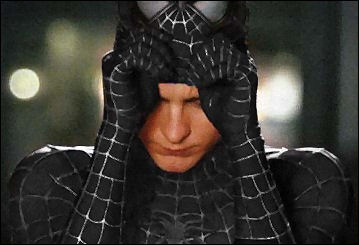
Am I saying this because McCarthy is saying what I’ve been suspecting would be the case all along? Yes. It’s no secret that I’m predisposed to trash Spider-Man 3. (And I don’t like living in this place at all, let me tell you. I wish there were reasons to expect something better. Harboring prejudicial feelings feels like you’ve got a cold in your chest.) But you don’t need to look into Professor Marvel’s crystal ball to formulate a pretty good idea of what’s coming.
McCarthy is a widely respected guy who, by my standards, gets it right fairly often. (His biggest boner was dissing The Big Lebowski when it had a special Sundance screening way back when.) His review and reviews like it will mean absolutely nothing to the fanboy hordes, of course, but at least they (as well as others of discerning taste) now have something to give them pause.
“The three main recurring characters get stuck in a rut and the same can be said of the film itself in Spider-Man 3,” he begins. “After the significant improvement of the second installment over the first, new entry reps a roughly equivalent dip in quality and enjoyment, with Spidey now giving off the faint odor of running on fumes.
“This devaluation shouldn’t hurt at the box office, at least at first, as the vast majority of the fans who turned the first two into $822 million and $784 million worldwide grossers, respectively, will cram multiplexes around the globe to see the first blockbuster of the summer.
“A sense of strain envelops the proceedings this time around. One can feel the effort required to suit up one more time, come up with fresh variations on a winning formula and inject urgency into a format that basically needs to be repeated and, due to audience expectations, can’t be toyed with or deepened very much.”
No rave from Rechtstaffen
Spider-Man 3 may have more to deliver than the usual fan-wanking, simple-dick plotting and intravenous CG opium, to judge by this rave Michael Rechtshaffen review in the Hollywood Reporter. But I’ve had issues with Rechtstaffen before and I really don’t trust him much. Nobody should. He’s a “trade reviewer” who accepts the notion that he’s supposed to keep things fair and polite and balanced, which means that a lot of his reactions, in my view, tend to be a little too gracious.
Keep in mind that Rechtshaffen gave a friendly pass to The Last Mimzy — that should tell you a lot.
Besides, it you carefully examine Rechtshaffen’s prose, you’ll see that he’s not exactly trumpeting Spider-Man 3 as anything too wondrous.
He calls it “dazzling” — a rote adjective that’s syonymous with “eye-filling,” which is hardly a stunning achievement for a film of this sort. He says that “arachnophiles everywhere” — i.e., fans of the previous two Spider-Man films — “finally have cause to celebrate” after an absence of three years. What else are fans of a big franchise supposed to do when part 3 finally rolls out — vomit on the sidewalk?
Rechtstaffen’s most troublesome proclamation is that Spider-Man 3 “has done it again,” which is far from comforting news to this columnist.
Noting that the film is “certain to please the geek squad by remaining ever true to its comic book roots while retaining that satisfying emotional core that has registered with equal numbers of female fans,” Rechtstaffen declares that Spider-Man 3 “has all its demographic bases covered.” This is a trade review, all right — a few upbeat pat-on-the-back sentiments aimed at Columbia advertisers, confident clucking about how satisfied the fans will be (and how much money will be made), an attaboy marketing analysis.
Surprising as this may sound, Rechtstaffen allows a note of negativity to slip into paragraph #4. “While the picture as a contained whole might fall an itsy-bitsy short of the personal best set by Sam Raimi’s 2004 edition, the wow factor works overtime with state-of-the-art effects sequences that often are as beautiful as they are astonishing.”
Did everybody read that? A politically-minded Hollywood Reporter critic says Spider-Man 3 is not as good as the last one (i.e., the “Doc Ock” version with fat Alfred Molina) , which I thought was just okay and which I’ve never wanted to see a second time. I take it back — Rechtstaffen hasn’t written a rave. It just seems like one from the headline and the gushy first three graphs.
Brando doc
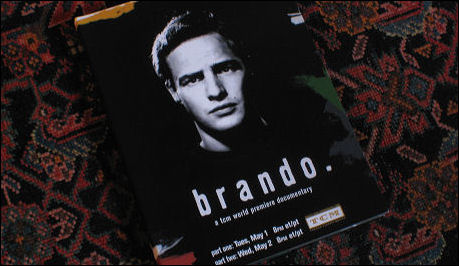
Weekend viewing material that’ll be shown at the Cannes Film Festival along with some kind of party being thrown (on top of the domestic TCM airings on 5. 1 and 5.2)
A long way to go
The Cannes Film Festival is “a long way to go to see Sicko a few weeks early. And it’s a rather expensive trip to see next year’s Robert Koehler Collection three months before the highlights all land in Toronto.” — from David Poland‘s 4.20 Hot Blog…funny. But does this mean Poland has figured out a way to see No Country For Old Men and My Blueberry Nights in Los Angeles sometime next month?
Auteur theory goes south
“The auteur theory, I’ve finally decided, can kiss my ass,” says Guardian columnist John Patterson. “I’m done with it. It bores me. I flee in great haste from the mere mention of its name. It’s a cult of personality. It’s a marketing scheme. It’s become a misleading umbrella-term falsely uniting a diverse body of collectively created work under a single name.
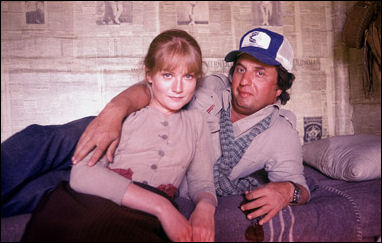
“And it just encourages the tacky, egomaniacal film-school cult of the writer-director as lone presiding genius. More and more I tend to find myself believing in what the writer Thomas Schatz called ‘the genius of the system.'”
Patterson is right in implying that if it hadn’t been for Andrew Sarris‘s The American Cinema, which popularized the French auteur theory after Sarris wrote his first seminal essay on the topic in ’62 or thereabouts, we might not have had the legend of Michael Cimino and therefore the debacle that was Heaven’s Gate.
Wait, I forgot: Heaven’s Gate has been elevated into semi-respectability (or is it full respectability?) by tireless Cimono pallies like F.X. Feeney and is now…what’s the party line?….a fascinating American pastoral piece that was judged too quickly and harshly when it first came out.
[Note: The Patterson essay was linked earlier today on Movie City News, which means that all linking rights from this point on are owned by David Poland. I am choosing to ignore this for reasons that presumably don’t need explaining.]

